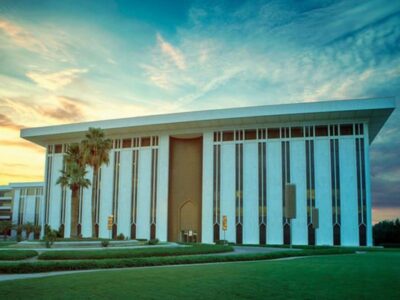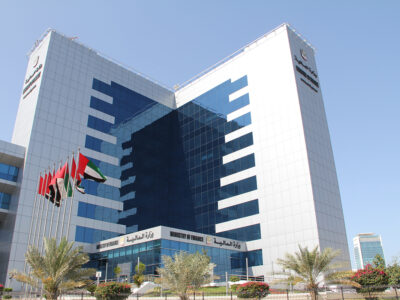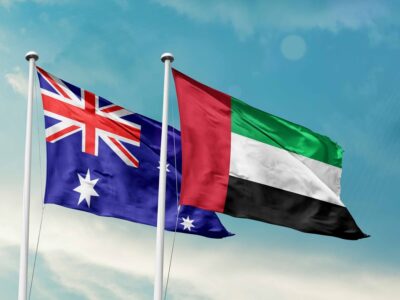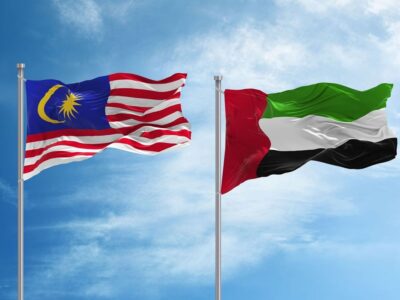Political turmoil and rising unemployment are fuelling a new exodus of ethnic minorities from South Africa – many of them destined for skill-starved Gulf economies. As dissidents prepare to abandon the ruling African National Congress, Nobel laureate and former president FW de Klerk explains why the country risks becoming mired in a new form of institutionalised racism.
The elevator to the 17th floor of Dubai’s Atlantis Hotel is crammed with people talking in Afrikaans, once the official language of South Africa. Now it’s one of 11, thanks in some part to the man staying in the room known as the ‘Regal Suite’.
It is also a language that is heard on building sites, classrooms and offices across the Gulf with increasing frequency, as South African minorities flee rising unemployment and deteriorating security at home in search of better pay and prospects abroad.
Frederik Willem de Klerk is a hero to some of them. To others, in his words, he is a ‘traitor’ – the man who dismantled white power and privilege, bringing the apartheid era to an end. 15 years after receiving the Nobel Peace Prize alongside Nelson Mandela, for laying the foundations of democracy in the country, de Klerk says many white South Africans have become marginalised in the workplace.
“They accept the need for affirmative action and the need for black economic empowerment, but when it becomes unbalanced to the extent that it becomes a new form of institutionalised racial discrimination, it’s unconstitutional and it is as wrong as apartheid was,” he says.
Whites are fleeing South Africa in what could be the largest exodus of minorities since the country’s first democratic elections in 1994, as high unemployment and inflation combine with power shortages and rising crime.
Africa’s largest economy has the highest unemployment rate of 61 countries tracked by Bloomberg, which rose to 23.2 percent in the third quarter of 2008. It is also number two behind Venezuela on the ‘World Misery Table’, which combines a country’s unemployment with its inflation rate.
The black population of South Africa has risen to a projected 38.5 million from 31.8 million in 1996, according to government statistics. The white population fell to 4.5 million from 4.8 million over the same period.
At the age of 72, FW de Klerk is busier now than when he was in power in South Africa as the last apartheid-era leader of the country.
He flinches at being described as such.
“I don’t like your description of me as the last leader of the apartheid-era South Africa – I was a bridge between the apartheid South Africa and the new South Africa,” he says. “I was one of the parents of the new South Africa. I abolished all apartheid laws. When the ANC came to power in 1994 there was no discriminatory legislation left on the statute book.
A lawyer by profession, de Klerk talks in the considered and convincing way of an attorney summing up in front of a jury. He speaks more slowly now than as I recall during the highly charged days of April 1994 when South Africans were preparing to go to the polls to participate in the country’s first democratic elections and millions of people queued outside polling stations to usher in the new ‘rainbow nation’.
He chooses his words not carefully, but impeccably and it is difficult to interrupt him when he’s in full flow. “In partnership with President Mandela and other political leaders in South Africa, we jointly abolished apartheid. I didn’t wake up one morning and say apartheid and separate development is wrong. It was a whole process not only for me but for the broader leadership of the National Party,” he says.
De Klerk insists that he and others in South Africa’s National Party had accepted the need to end apartheid from the early 1980s and submitted what he describes as “a new vision” to the party in August 1986.
“We went to the white elctorate in May 1987 and said in a sense we are abandoning this separateness, this apartheid.
“I called a referendum and asked the white electorate should I go ahead with this ‘yes’ or ‘no’ – and 69.9 percent said yes. So about one third of whites in South Africa – they called me a traitor then and they still believe that I sold the country out.
The other two thirds realised that although it demanded sacrifices from them, that it was necessary to avert a catastrophe and want the new South Africa to succeed.”
He offers three causes for the current exodus of whites and other South African minorities from the country.
“The main reasons given by people leaving South Africa is that they can do better financially. Secondly, the high crime rate and thirdly the unbalanced affirmative action and a new form of institutionalised racial discrimination in terms of affirmative action and black economic empowerment, against white South Africans, Indian South Africans against non-black South Africans,” he says.
“That has happened and that is one of the causes for an exodus of highly trained people who think there isn’t a future for their children because of discrimination against minorities.”
Political tension may also be driving people away. An outbreak of anti-immigrant violence killed at least 59 people in May in what was the worst wave of attacks since the ANC came to power fourteen years ago.
A power struggle within the party has also led to the formation of a splinter group under former defence minister Mosioua Lekota and Mbhazima Shilowa, the former premier of the central Gauteng province.
They met to discuss possible names for a new party which will contest elections next year and may represent the biggest threat to the ANC since it took power in 1994.
De Klerk sees this as a positive step for the country, mirroring the fracture of his own party more than two decades earlier which eventually led to the dismantling of apartheid.
“We don’t know how far-reaching the split will be. I’ve been predicting it and I think it will be good for democracy in South Africa,” he says. “The ANC alliance came together because of a common wish that there should be an end to apartheid – that was the cement which brought communists, non-communists, far-left socialists, pragmatists and nationalists, all together in one room.
That cement is gone. Apartheid is gone. The ANC is in power and what you are seeing now is a natural development.”
He compares it to the resignation of the notorious right wing politician and Conservative Party leader Andries Treurnicht from the National Party in 1982. Treurnicht became infamous for his views on apartheid, which he called “separate freedom”.
De Klerk says his decision to abandon the party liberated many of those who remained behind.”We no longer had to keep together people who didn’t really believe in the same things. The same is happening in the ANC now to a certain extent,” he says.
Unlike some of his peers, De Klerk does not see the split within the ANC in terms of political strife as much as an almost inevitable democratic evolution.
“If this takes us to a realignment in party politics where instead of the lines being drawn in the old traditional terms, they are now drawn on the basis of principles and philosophy and policy, so we move away from ethnic-based policy towards value-based policy, it is good for democracy and I hope it will bring about a better balance of power and will make our democracy healthier.”
De Klerk has been out of party politics in South Africa for more than a decade and he spends much of his time these days touring the world along with 26 other former presidents, prime ministers and senior ministers.
Together, they give what he describes as “discrete confidential advice not for profit to leaders in government in the developing world who realise they need to change on governance issues”.
He clearly believes many of those changes need to be made in his own country but is also confident that the lost generation of South Africans will eventually return.
“I think as far as crime is concerned and affirmative action, the pendulum has swung and there is a realization in the new ANC also under the new leadership that they’ve got to get skilled people and the best ones to get are South Africans who know the country.”
De Klerk is now an observer of party politics in South Africa rather than a participant, but he always sounds a positive note. He’s always arguing, always trying to convince the jury.
To some extent, his own political legacy and place in history depends on the success of the new South Africa.
“I’m optimistic we are beginning to see the end of unbalanced affirmative action and black economic empowerment and are moving into a phase of a better balanced way of ensuring upward mobility,” he says.
“In the end, the best way of empowering people is better education and better training.
“If you empower the individual so he or she can reach their full potential then you do the best form of affirmative action imaginable.”







